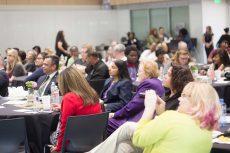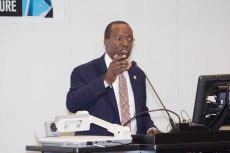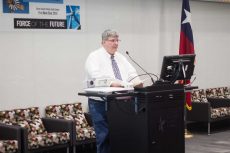By Hannah Lathen/ campus editor

Photos by Bogdan Sierra Miranda/The Collegian
Five South Campus students received $500 President’s Scholarships for essays focusing on improving student involvement on campus Nov. 15.
Learning lab manager Gabrielle Raymond says this scholarship contest is important because it asks students how South Campus can be improved.
“It is a huge opportunity for students to speak directly to president Peter Jordan, the deans, and VPs and even our chancellor,” she said.
Student development services vice president Larry Rideaux says this scholarship has gone a long way in impacting students by not only helping with their expenses but also by getting a chance to learn from the students.
“The purpose for rewarding these scholarships is to help students defray the cost of their college education while receiving creative insight and ideas from our students about how to enhance the South Campus student experience,” he said.
Students had to write an essay answering “How can Tarrant County College South improve participation in campus life to create an even more vibrant and active campus community for students?” The five winners — Stephanie Clements, Vinicius Ferreira,

Amanda Mastriania, Lavitta Williams and Henry Wolanski — read their essays and received $500 checks at the President’s Scholarship Luncheon.
Williams used her essay to voice some ideas and the desire for an increase in the administrative presence in student activities.
“I honestly was really not going to submit an essay, but I kept being bombarded with the email about the announcement and a little voice kept saying ‘you need to submit,’” she said.
Clements, a member of Phi Theta Kappa and SGA senator, said a solution for getting students more engaged was to push student activities further with the resources already on campus like the TVs in the hallways.
“I have gone to a lot of events, and I have seen that there is not a lot of turnout, and I felt that it was because there was no communication between students and event holders,” she said.

Jordan says when the scholarship was started four years ago, the administration wanted to hear students’ voices on issues and get to know their feelings.
“It’s essays like these that continue to give us themes that motivate us, the administrators, to think more deeply about the work that we do and what it is that helps students engage and succeed here,” he said.

